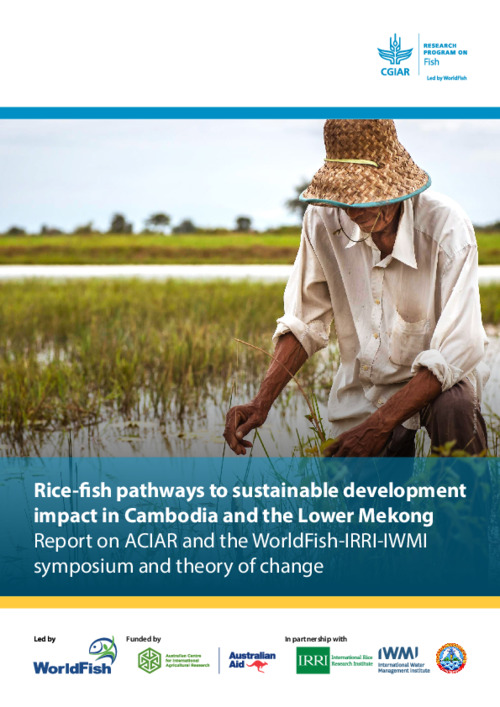Rice-fish pathways to sustainable development impact in Cambodia and the Lower Mekong: Report on ACIAR and the WorldFish-IRRI-IWMI symposium and theory of change

Rice and fish are central to the livelihoods and nourishment of the people of Cambodia and of other
nations in the Lower Mekong Region. They are vital to progressing many of the targets of the Sustainable
Development Goals (SDGs) related to livelihoods and nutrition and health. The ways that rice and fish are
produced, distributed and consumed will also influence the degree to which biodiversity is conserved,
ecosystem functions and services are protected, and the maintenance of water quality and flows that
define the Mekong. Integrated production of rice and fish offers important lessons and opportunities for
meeting multiple well-being targets and environmental objectives, as well as developing cross-sectoral
partnerships. In recognition of this, a collaboration was developed to envision the contribution of integrated rice and fish production to impact pathways for meeting well-being targets and environmental objectives. This collaboration drew upon place-based and long-term experiences of WorldFish, the International Rice Research Institute (IRRI), the International Water Management Institute (IWMI), the Fisheries Administration of the Royal Government of Cambodia (FiA) and the Australian Centre for International Agricultural Research (ACIAR). These were shared through a symposium that reflected on context-specific lessons for integrated rice and fish production. This was followed by a participatory theory of change exercise that helped integrate lessons, diverse expertise and common objectives into on-farm, landscape and value chain impact pathways. There are several expected outcomes from the impact pathways, including (a) sustainably managed, resilient fish and rice agroecosystems, (b) equitable rural livelihood improvements, (c) improved availability of Cambodian produced fish/prawn in local and urban markets, and (d) enhanced nutrition security for women, men, youths and children in Cambodia. The aim of this report is to share the symposium lessons and the envisioned impact pathways and their associated theory of change to inform long-term planning and enable strategic investment in rice-fish agroecosystems in Cambodia and the Lower Mekong Region. Various One CGIAR initiatives that are currently under development may be able to build on this report in one of two ways: (1) implement or adapt and implement the proposed theory of change for Cambodia, or (2) use the information to plan investments into fish and rice systems in other nations within large river basins and deltas in Southeast Asia or elsewhere.
Permalink
Date Available
Type
Publisher
Countries
Copyright
CC-BY-NC-4.0
Research Themes
Language